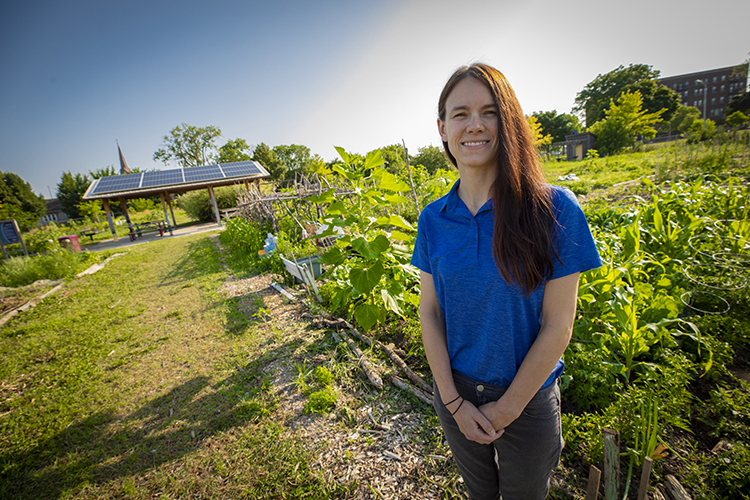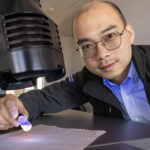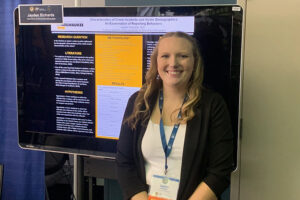A UWM alumna is helping make Milwaukee greener.
Janeé Pederson is an environmental and water resources engineer with GZA, a consulting firm that provides environmental, water, ecological, geotechnical and construction management services.
Pederson, who works from the Waukesha and Milwaukee offices of the Massachusetts-based firm, is currently involved in two projects that are part of the redevelopment of Milwaukee’s 30th Street industrial corridor: Cream City Farms, a large urban farm, and the Green Tech Station, a demonstration site of green infrastructure technologies.
Both involve the transformation of former industrial sites into usable land. The City of Milwaukee is the client for the projects, which are in part supported by the Metropolitan Milwaukee Sewerage District. One of the goals of both projects is to help reduce basement backups and flooding in the area.
“The area has had flooding issues and a lack of attention historically,” said Pederson. “They’re projects that are pretty important to the community.”
Industry left polluted soil
The chemicals and pollutants used by the industries that formerly occupied the area have affected both the soil and the groundwater, she said.
As a result, the GZA team had to manage the contaminated soil to restore the area. “In a sense we’re redeveloping it into a usable property, but also cleaning it up,” Pederson said.
Pederson, who grew up in River Falls, became interested in engineering during middle school, inspired by a STEM (science, technology engineering and mathematics) camp for girls that she attended.
It wasn’t until later that she learned there was an engineering track that focused on the environment.
“I’ve always been passionate about trying to better the Earth where I can,” she said. “This field and my role at GZA definitely helps me do that.”
She came to UWM because she liked the engineering program, but also wanted a city atmosphere in a place new to her.
While an undergraduate, she interned with MMSD.
“There was a lot of encouragement in the engineering department to do internships. I worked for MMSD for three summers, and that helped start my career, my path into the professional world.”
Working on Alice’s Garden
Her classwork dovetailed nicely with what she was doing in the field, she said. That relationship between academics and the field continued when she went to work full-time at GZA while starting the master’s degree program focused in environmental and water resources engineering.
One of GZA’s clients was Reflo, a nonprofit focused on sustainable water solutions and directed by another UWM alum, Justin Hegarty. Among the organizations Reflo works with is Alice’s Garden, which covers more than two acres on N. 21st Street south of North Avenue. The garden’s leaders were looking for a way to trim its water bills, which ranged up to $3,000 annually.
“They were looking for a way to harvest the rainwater and make the garden more sustainable,” Pederson said. With a green infrastructure grant from MMSD, the garden worked through Reflo to facilitate the project, getting the right people to the table and helping raise funds. Reflo, which had worked with GZA previously, approached the firm about doing the design and building the rainwater harvesting project.
Pederson, who had graduated, was working full-time at GZA and on her master’s degree in the evening. One of the areas she wanted to learn more about was green infrastructure design. So, working with mentor Hector Bravo, UWM professor of environmental engineering, she took on GZA’s Alice’s Garden project as an independent research study.
‘Invaluable to this project’
Hannah Johnson-Breimeier, part of the working group for the Alice’s Garden Rainwater Harvesting Project, said Pederson put a lot of work into the project, including designing the pump, filter and disinfection and distribution system.
“Janeé’s thoughtful research and design was invaluable to this project,” Johnson-Breimeier said. “We are grateful that she dedicated her time and expertise to Alice’s Garden.”
GZA had envisioned collecting storm water runoff from a large parking area at the adjacent Brown Street Academy, Pederson said. The parking area wasn’t used a great deal so didn’t have as much oil and other pollutants as similar lots.
A bioswale, built between the parking lot and the garden, helped filter the water, which was then diverted into an underground cistern. The water pumped from the cistern then traveled through a two-step filtration system to remove any remaining particles and treat it for bacteria and viruses.
A solar-powered pump would distribute the water to taps throughout the garden. Another benefit of the project was reducing stormwater-caused flooding in the neighborhood that resulted in basement and sewage backups, Pederson said.
Assessing the quality of the water
A key part of Pederson’s research was doing a water quality assessment to make sure the harvested rainwater was filtered well enough for watering the garden.
Urban stormwater runoff often contains dangerous levels of high-risk pollutants such as heavy metals, waterborne pathogens, polycyclic aromatic hydrocarbonsand chlorides, Pederson said.
With filtration, the water, though not drinkable, is safe to use in gardening.
The system is just about up and running, said Pederson. She completed her master’s degree in May 2018 but is still following up on the project. Plantings for the bioswale are in place and a solar-powered pump to bring water to the gardeners is nearly finished.
“It’s been an interesting and really rewarding experience working with this kind of client,” Pederson said. “They’ve always been excited and very grateful for what you do.”








